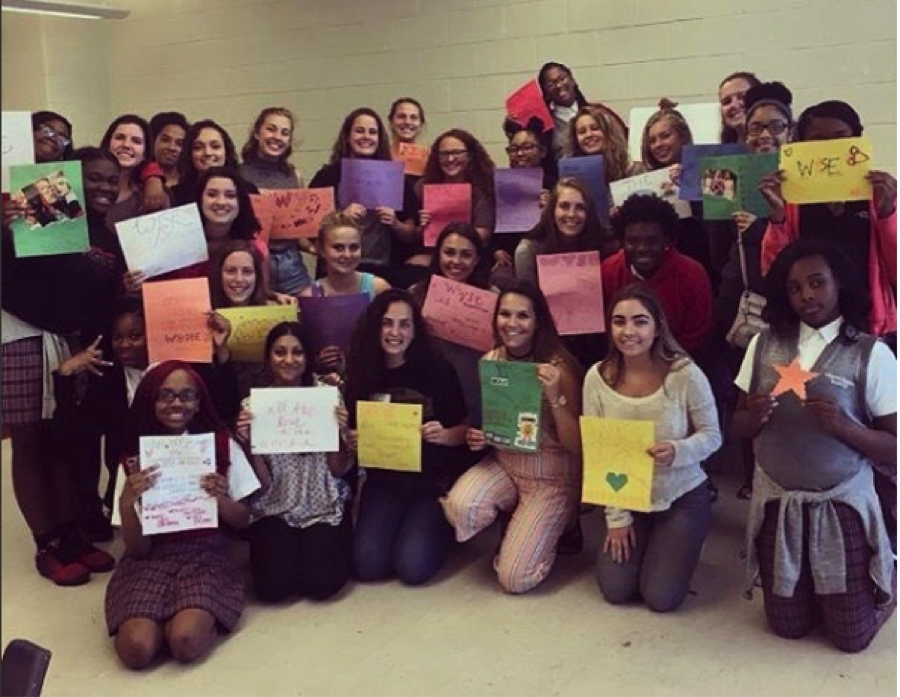By Courtney Pellegrini
Meet Chrysean- an outgoing, charismatic middle school student at Langston Hughes Academy in New Orleans, LA. She loves dancing in Mardi Gras parades and hanging out with her friends, and she dreams of going to Harvard and becoming a cardiologist someday.
Chrysean is just one of hundreds of adolescent girls across the nation who participates in Women and Youth Supporting Each other (WYSE), a national mentorship organization focused on women and girls empowerment. Every week, volunteer collegiate women at twelve different universities across the nation run after-school programs in underrepresented communities, addressing critical issues such as conflict resolution, healthy body image, and reproductive health and education. With support and resources from WYSE’s mentorship program, students like Chrysean can learn the leadership and personal skills needed to fulfill their dreams of becoming our nation’s future cardiologists, educators, lawyers, and more.

I started working with WYSE’s New Orleans branch three years ago, at the beginning of my freshman year at Tulane. Every week, I (along with 10-15 other Tulane mentors) would go into Langston Hughes Academy to teach middle school girls a sexual health curriculum in a safe, supportive environment. Throughout the years, I’ve formed great mentoring relationships with the girls and have even been lucky enough to see some of them graduate 8th grade and move on to some of the best high schools in New Orleans. It’s been such a big part of my life here at Tulane, but I was also intrigued by the broader national scope of the WYSE program. Even though I was enjoying my work “on the ground” within the New Orleans school system, I wondered “What does this organization look like on a national scale? How does a nonprofit board run a dozen successful programs like this all over the nation?”
In December, I was awarded a chance to find out the answers to some of those questions. The WYSE National Board was looking for interns to help them run the “behind-the-scenes” part of WYSE, and I jumped at the opportunity to learn more about the organization. I joined the national board as their new Operations and Development intern, reporting to the National WYSE Operations and Finance chair through weekly Skype calls. Since my work was all done online, I could do it remotely throughout my spring semester at Tulane while I was still helping run on-the-ground programming at Langston Hughes Academy. It was a unique opportunity to experience both branch level and national level work simultaneously at a nonprofit organization.
When I first started working, I had no idea what to expect. However, I quickly developed a great relationship with my supervisor, Linda, and jumped into the projects she had planned for me. First, I made a developmental research presentation for the national board; this basically meant contacting a bunch of different nonprofits that had a similar mission/target group as WYSE, and seeing how they ran their organization. What did their revenue model look like? How were they getting most of their money- from individual donors, foundation grants, or corporate partners? Maybe it was a combination of all three. Where did they even find these grant opportunities, anyways? Were they run by a volunteer staff? How much of their revenue went towards direct programming? These were the kinds of questions I was very curious to answer, and by the end of a few weeks, I had a plethora of information and financial data from many different nonprofits across the nation. I organized all of the data into an easy-to-understand presentation, and sent it to the national board for them to review at their annual board retreat. They were thrilled with the research, and it gave us a lot of insight as I moved onwards to the second big project of my internship: fundraising for both the local branches and for the national board.

This portion of the internship involved writing donation templates, thank you letters to donors, and crafting a fundraising presentation to present to executive branch directors at WYSE’s National Leadership Training Conference (which was to take place the upcoming summer in Washington, D.C.) I also crafted a national crowdfunding campaign for the WYSE board through the IndieGoGo platform to help offset the costs of programming. At this stage, I had to do a lot of research on how nonprofits can successfully fundraise. Something I had learned in my SISE classes at Tulane applied really well here- namely, the fact that people respond better to your mission when you tell them a story. Most successful projects start with empathizing with the people you’re working with; whether you’re asking them to donate money to a cause or trying to solve a problem in their community, it’s so important to remember that they are people first, and your donors/partners/whatever else second. Empathy is the root of human centered design, and recognizing this helped me a lot while fundraising for the nonprofit sector.
Overall, this internship was a wonderful experience that overlapped a lot with the concepts I had learned in my SISE classes here at Tulane.
